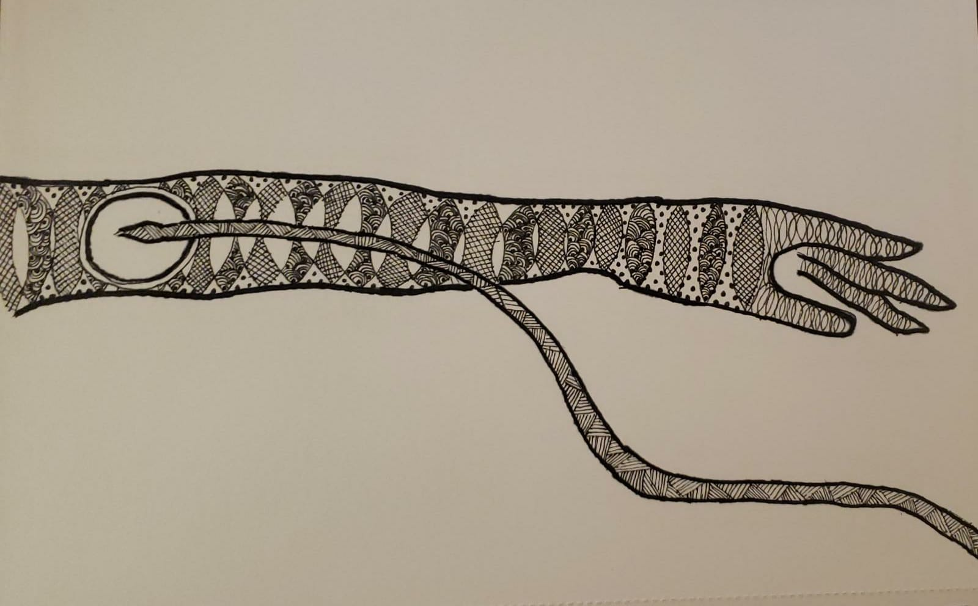Humanism – Art Reflection

Humanism – Art Reflection
Maimoona Altaf & Jenny Liao
A Zentangle of a patient’s experience with an error in medicine and the holistic approach to her care that followed. A reflection on errors in medicine and forgiveness.
About Zentangle:
Zentangle is a form of art where the artist uses repetitive simple patterns to create an image, usually with black pen on white paper. Simply put, the artist creates a main border which can be any shape and within it, you add “strings” and create patterns guided by these strings. It has been used as a form of mindfulness based art therapy and form of meditation in the past as it has many key principles based on introspection that we used to reflect on our experiences as clerks during our surgery rotation.
Maimoona’s Reflection:
A key component of Zentangle is using a non-erasable black pen. The rationale behind this is the act of embracing mistakes and allowing for self-forgiveness. This concept encouraged me to reflect on errors in medicine and my own experience with this during my general surgery rotation. The incident occured with one of our patients who was pregnant and set to have an appendectomy. This, in itself, was a stressful case given the high risk of miscariage involved. Unfortunately, during the surgery, her IV went interstitial and she suffered from quite a painful cellulitis as a result. However, I think the way the anesthesiologist and surgeon dealt with this situation was quite commendable in that they were honest and upfront with the patient about this error, rather than trying to hide or dismiss the error. They instead took this as an opportunity to provide empathetic and patient centered care. They would routinely check up on her and provided her with the option of extending her stay at the hospital if she felt more comfortable doing so. Ultimately, although this error occurred, on discharge, the patient still felt like she received good care because her healthcare providers were honest with her and she was actively aware of/engaged in the course of her hospital stay.
Another key component of the zentangle process is admiring your art peace in a non-judgement, kind and forgiving way on completion. I think it is important to remember that as healthcare providers we are still humans and mistakes are inevitable. As long as we are honest and learning to grow from them, we should give ourselves the space for reflection and forgiveness. Without this, we can ultimately become burnt-out and even resentful. Therefore, I believe it is utmost important to remind myself of these aforementioned principles of Zentangle as a clerk and future physician.
Jenny’s Reflection:
During my general surgery sub-rotation, I met a patient with Crohn’s disease who presented to the hospital because of worsening symptoms. Our surgery team was consulted because she was not responding to medical management and was therefore being referred to explore surgical options. Our team assessed her and believed that she would be a candidate for surgery. We explained the procedure to her in regards to needing to resect part of her bowels and creating a stoma, and she consented to the surgery. Her surgery went well with no complications and limited blood loss. For our team, the surgery was a success. However, in the following days when we checked up on our patient, we noticed that her mood was low. We found out that she was having difficulty coping with her new stoma. This prompted us to consider possible supports that can help her with this transition including involving a social worker. I think this experience highlights the importance of remembering that our patients are not just a body of organs but they are people filled with complexity and have hopes and feelings. This idea is reflected in our zentangle drawing where small simple shapes put together are transformed into an intricate artwork.

